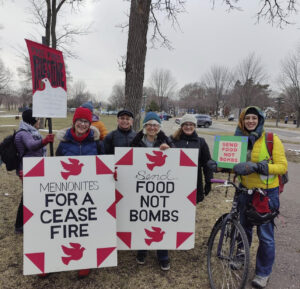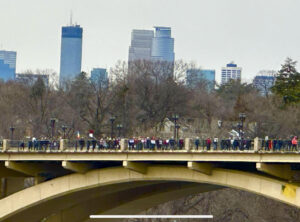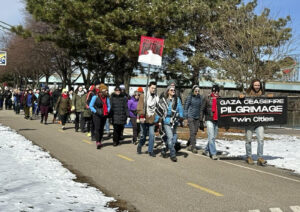 BY ELAINE KLAASSEN
BY ELAINE KLAASSEN
On Saturday, April 12, 2025, Christians, Christian-lineage people and allies of other faiths are invited to join a Lenten Pilgrimage of lament and protest against the ongoing injustice of Israel’s military occupation in Gaza and the West Bank, and the United States’ support for the bombing and annihilation of Gaza.
Devotions, worship and meditation along the 14 miles will correspond to the traditional Stations of the Cross, which depict the crucifixion of Jesus, from his sentencing until his burial, one of the most powerful stories of egregious injustice in the world. The scenes represent the suffering brought about by this terrible injustice and show the compassion that is humanly possible. Many of the texts will come from Palestinian Christians.
The organizers of the pilgrimage, MN Christians for a Free Palestine, reflect that Christians have a responsibility to speak out against the suffering of Palestinians as they are consistently displaced from their land and homes, have been targeted for ethnic cleansing by the U.S., and the ceasefire has been violated.
The commitment of the pilgrimage is to: Grieve the genocide and overwhelming loss of life in Gaza; repent of our religion’s and nation’s contribution to the violence; stand in solidarity with Palestinians in the face of ongoing military occupation and apartheid; mobilize in support of Palestinian liberation beyond a ceasefire.
Starting with a 6:30 a.m. sunrise service at Kroening Nature Center, 4900 Mississippi Drive, the pilgrimage will follow the paved path along the Mississippi River and stop at the Heron Rookery, the Mill City Farmers Market, Faith Mennonite Church (2720 E. 22nd St.) for lunch at 12:10. p.m., the Danish American Center, Minnehaha Falls, and arrive at Bdote (the confluence of the Minnesota and Mississippi Rivers) later in the afternoon, around 4 p.m. There will be a dinner with catered food, footwashing and a prayer service around 5 p.m.

MN Christians for a Free Palestine March, on the Lake Street-Marshall Avenue Bridge (2024)
Last year’s walk in the Twin Cities was 22 miles, the length of Gaza from north to south. Joan Kreider, who walked 15 of the total miles last year, said that picturing herself walking along the same distance as the length of Gaza gave her a sense of solidarity. “It felt like I was walking with the Gazan people.”
Anyone who cares about Gaza and is opposed to Christian nationalism is welcome to join the pilgrimage. Christians for a Free Palestine describes its purpose as: “This is a call to our Christian community to use our public voice and collective power to advocate for peace, challenge Christian Zionism, and all forms of empire.” It insists that the pilgrimage be nonviolent.
Here is its statement of faith: “At the core of our faith tradition is a story of grace and transformation. Our responsibility as Christians is to live out this liberating narrative. We believe in the power of nonviolent civil disobedience to heal and transform our communities. We seek to directly confront the powers of imperialism through nonviolent direct action, as Jesus did. We believe that we are all created in the image of God and every life is sacred. We uphold the dignity of all people and reject and resist all manifestations of antisemitism, Islamophobia, racism, heterosexism, and xenophobia.”
Gaza Ceasefire Pilgrimage, another group participating in the pilgrimage, emphasizes the importance of speaking the truth with love in this action. “We hurt the movement (and are not faithful to Jesus) when hatred of anyone or any People clouds the clarity of naming the war crimes being committed by the modern nation state of Israel. If hatred animates your analysis or activism, we are not the movement for you.
“We are about nonviolent solidarity not neutrality. We value every human life as made in the image of God and because of this we must tell the truth about this symmetrical conflict in the context of apartheid policies, military occupation and what experts overwhelmingly identify as genocidal intent in Israel’s war on Gaza.”
In times of crisis, such as the times in which we find ourselves, as it dawns on us that our system of governance with its checks and balances (for all its many flaws) has disintegrated under a president who has no regard for the common good, I feel myself being pulled in the direction of the church in which I was raised — the Mennonites, who descended from the Anabaptist movement of the 16th century — the Anabaptist Movement, which “for 500 years has been a direct affront to Christian nationalism,” says Joanna Lawrence Shenk, a Mennonite pastoral leader.
I have been an official member, on the rolls, of Faith Mennonite Church since about 1984, but haven’t attended church there as an active member since 1999. I nevertheless embrace Mennonite beliefs. That is, I am against war and support the cause of peace, both in conscientious objection to paying taxes for war and to serving as a combatant in war and, also, I have worked seriously to learn the spirit and skills of nonviolent behavior on many levels; I am committed to being a steward of the Earth and try to live simply and respectfully; I believe that the state and the church are separate entities and carry out separate missions, which sometimes are in conflict with each other — the stars and stripes behind the altar in any church freaks me out; I believe that the baptism of an adult symbolizes their commitment to a life of love and sacrifice for others such as the life that Jesus lived. In other words: pacifism, conservation, separation of church and state, and adult baptism.
Recently, a new organization called Mennonite Action started appearing in my inbox. Its most notable campaign, among many, was its 11-day, 135-mile march from Harrisonburg, VA to Washington, DC, in July of 2024, calling for a ceasefire in Gaza. So when I heard there was a Minnesota chapter of Mennonite Action meeting regularly at Faith Mennonite Church, I joined them.
Mennonite Action, founded last year by two young Mennonite men from Pennsylvania and New York, Adam Ramer and Nick Martin, includes Mennonites and likeminded people throughout North America. On Mennonite Action’s podcast, Front Light, the founders described leaving their political jobs working for a representative to Congress because he wouldn’t call for a ceasefire in Gaza. (He has since changed.) They are committed to love and compassion and feel compelled to show a different Christian story than the one being shown by Christian nationalists. I especially resonated with their inspiration to organize after seeing Jewish and Muslim groups of young people organizing themselves for action based on their faith traditions, their cultural affinities.
 The suffering of Palestine and Israel has been on my mind for many years. I first heard about what was happening in Palestine from Christian Peacemaker Teams (now called Community Peacemaker Teams) who go to areas of conflict in the world and try to support oppressed people. They are like Simon who helped Jesus carry his cross. Some people from CPT who had been “deployed” as peacemakers to Ramallah in Palestine, came to visit Faith Mennonite Church while I was still going there, in the early 1990s. They told how Palestinian people’s homes were bulldozed on a regular basis by Israeli forces.
The suffering of Palestine and Israel has been on my mind for many years. I first heard about what was happening in Palestine from Christian Peacemaker Teams (now called Community Peacemaker Teams) who go to areas of conflict in the world and try to support oppressed people. They are like Simon who helped Jesus carry his cross. Some people from CPT who had been “deployed” as peacemakers to Ramallah in Palestine, came to visit Faith Mennonite Church while I was still going there, in the early 1990s. They told how Palestinian people’s homes were bulldozed on a regular basis by Israeli forces.
Since then I have tried to learn about and understand the heartbreak of Israel and Palestine.
Here’s my summary. Maybe I’m wrong. After the Holocaust, the surviving Jewish people from Germany had nowhere to go since the U.S. wouldn’t take them, nor would Germany. That injustice was horrific and has had lasting repercussions. Where could they go? Great Britain decided they could go to the Land of Israel, where Arab and Jewish people had been living together peacefully for thousands of years. But in 1948 when the state of Israel was formed, which included killing Palestinians, or throwing them from their homes and leaving them destitute in order to make way for the state of Israel, resentment was born. Great Britain’s carving up the territory and creating an official entity called Israel was a big disaster that has had lasting repercussions.
From the beginning, the state of Israel has actively sought to get rid of the Palestinians. At least that’s how it appears at this point if you look at the bombardment of Gaza. Or if you look at U.S. complicity in starving out the Gazans through Blinken’s obscuring the fact that no aid trucks were getting through. Or if you see Israeli troops bulldozing homes and pouring cement into the water wells of truly destitute Palestinians who have nothing in a stark, barren landscape, as was shown in the academy award-winning documentary “No Other Land.” Or if I consider the observations of a nice lady from Farmington who went to live in Bethlehem to work in a nursing home, just to go somewhere different and be of service to others. She told me that what she saw in Bethlehem convinced her of Israel’s intentions. Or if I remember the woman I met at Powderhorn Park whose son-in-law had gone to work in Gaza during the early 2000s (I think) for his company, and discovered the dire conditions and confinement that people lived under. Jonathan Brennaman, a Palestinian American Christian who is one of the co-founders of Christians for a Free Palestine, related that half the children in Gaza are anemic and starving. The “joke” is that cutting them off from resources, the blockade, is “putting them on a diet.” It’s easy to see that policies to contain the Palestinians are based on fear. Fear leads to violence. It’s a natural phenomenon. Violence leads to more violence, and nobody has a good life.
On Oct. 7, 2023, Hamas carried out an extreme act of violence. Israel’s retaliation, or Israel’s attempt to kill every last member of Hamas, has flattened Gaza, and 67,000 people have died.
This is a well-known account. Less known is that many individual Palestinians and Israelis have worked together in harmony to form peaceful alliances. The last I heard, there are at least 200 Arab/Jewish peace organizations in Israel/Palestine.
Jonathan Brenneman, the co-founder of Christians for a Free Palestine (the people heading this pilgrimage), is a descendant of Palestinian Christians who are Mennonites. Only 1 to 2 percent of Palestinians are Christian, of whom only a handful are Mennonites. Brenneman, who spent time in Palestine with Community Peacemaker Teams, is strangely hopeful about peace, even as he mentions disturbing but important observations such as the antisemitism of some Palestinian Christians, or the antisemitism of Mennonites in Germany during WWII, or the fact that in U.S. media, they make Christian Palestinians the “good guys” and Muslim Palestinians the “bad guys.”
His hopefulness for peace rests on his grounding in Palestinian Christian nonviolence, which he believes stretches from the first century to the 21st. With other Palestinian Christians he helped to create the Kairos document which roundly renounces violence and calls on all churches worldwide to support them.
Editor’s Note:
About Jesus — I think it’s unfair to the actual history of the influence of Jesus not to quote Luke 22:36: “When I sent you out without a sword, did you lack anything? Now I say he who has no sword go out and buy one.”
And we need to talk about how the Jewish Revolt of ‘66 to ‘74 was inspired by his sacrifice.
And how the catacombs were a Christian underground plot against Roman Imperial authority that drove Constantine to Turkey, where in 325, he created a Roman, law-abiding Jesus as a god in his Roman Catholic Church.
And that version of Jesus ruled Europe for a thousand years, until some brave and bright young people rediscovered the anti-imperialist and communistic message of Jesus the Emancipator. And out of that the Mennonites were born. And the Puritans and the Anabaptists.
And some of those Puritans came to America believing in Christian love, “From each according to their ability and to each according to their needs.” Acts of the Apostles, Guilford Compact























it is lovely to see Christians in USA standing up against Christian Zionists with this act, to show courage exists in other Christians against Zionist (and mostly among evangelical) Christians